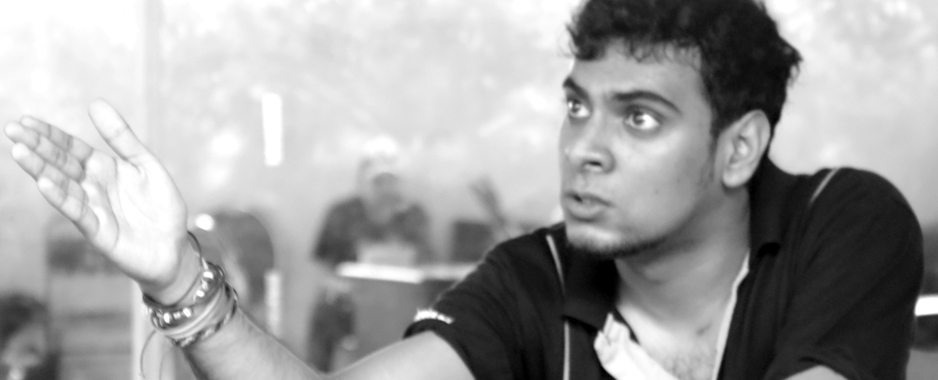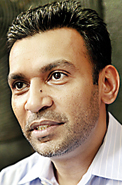After ‘Puss’, a different challenge for Feroze
For Feroze Kamardeen ‘Widows’ has something important to say about the times we live in. He first staged Ariel Dorfman’s masterpiece in 1998, right in the middle of the JVP insurrection, when the story about a nameless village with its missing men and grieving women seemed “topical.” Feroze was then in his twenties and ambitious enough to both direct and star in the performance.

Intensely charged role: Wasaam Ismail as the Captain
Over a decade later, the play has lost none of its potency and today Feroze continues to relate to it, seeing it as a reflection of his thoughts. With a cast that includes Wasam Ismail as the Captain, Gehan Blok as the Lieutenant and Swasha Malalasekara as Sofia, ‘Widows’ is a play with “a very serious message,” says Feroze: “It’s a play that will not only call on the audience to come and watch it, but a play that will ask them to ask questions afterwards. They may go away agreeing with the play or disagreeing with it, but it will create a conversation.”
For Feroze the play’s appeal lies in its brave complexity. “It has multiple messages and conversation points,” he says, clearly hoping to spark a debate. An Argentine-Chilean author and human rights activist, Dorfman was reportedly inspired to write a poem when he was unable to shake what felt almost like a hallucination: ‘an old woman by a river, holding the hand of a body that had just washed up on its shores. And the certainty that this scene had happened before, that this was not the first time that river had yielded a dead man to the arms of that old twisted woman.’ Having finished the poem, Dorfman remained haunted, choosing then to write a critically acclaimed book, which he set in a Greek village where a Danish man is picked up by the Gestapo, never to be seen again.
Then came the play whose action unfolds in an unidentified village, but whose references to the 14 families leads Feroze to speculate that it might be El Salvador. The village is populated by women, who have seen their husbands, fathers, brothers and sons simply disappear, presumably arrested by the army. Though a tenuous peace has descended, the women are disinterested in the future; instead they long to know what has happened to their men. If they are alive, they would like them back. If they are dead, they wish to bury the bodies and see the murderers brought to justice – something the army cannot allow.
Then one day, the river carries a body downstream. Mutilated and tortured, it is unidentifiable, but the women claim it and wish to bury it but are thwarted. Then the river delivers another body. The women find themselves in a standoff in which insisting on their right to mourn becomes a form of resistance. “If you look at a lot of the conflict areas that we have – Iraq, Afghanistan, Bosnia and Sri Lanka – there is a basic misconception that development is reconciliation,” says Feroze. While the army would forgive the women for their disobedience in exchange for the women forgetting about their stern reprisal and bring progress to the village, they miss the point. “For the women who have lost their men, it’s not about that. It’s not about buildings; it’s not about fertilizers, crops or animal husbandry. It’s about a very basic need – closure.”
The ambiguity of location gives the play a universal aspect, says Feroze. He and his cast have been working through the play carefully, spending hours analysing characters and their motivations.
“Mentally and emotionally, it’s very draining play,” he admits. For Feroze the conflict seems to really be between the Captain and Sofia – both of whom are fully committed to their chosen course and in Sofia’s case, it might mean the loss of everything she holds dear. Previous reviewers have faulted the women’s dialogue, described the play as “boring”, but Feroze is quick to defend the play, saying it speaks to those who’ve had their loved ones disappear. He was told as much by families that approached him after the 1998 staging to thank him for performing something that seemed to speak to their situation. “It was a landmark production for a lot of us,” says Feroze.

Feroze Kamardeen
He’s bringing what he learnt from that production to this one, though he confesses the details are little hazy. The production demands several settings, says producer Sirraj Abdul Hameed, explaining that getting the river right has itself been something of challenge – “we considered actual water,” he says, but they’ve settled for creating a river bank with rocks and playing with light and reflection to create the illusion of water.
Pulling it off will be a challenge for the whole team, whose most recent projects have been the subversive, political Pusswedilla plays, but it’s one they’re anticipating. They know their performance might divide their audience’s opinions, but that’s how you get a debate started.
“Widows” directed by Feroze Kamardeen and produced by Sirraj Abdul Hameed will be staged at the Lionel Wendt Theatre from November 23-25. It stars: Swasha Malalasekara, Bimsara Premaratne, Sulochana Perera, Kimaya de Silva, Haseeb Ahamed, Viranthi Cooray, Shiwanthi Kahandaliyanage, Dinoo Wikramage, Araliya Thevapalan, Shanila Jayasinghe, Sonali Fernando, Amali Fernando, Nisi Moonesinghe, Rebecca Munasinghe, Neluka Silva, Yashoda Suriyapperuma, Feroze Ahamed, Wasaam Ismail, Gehan Blok, Sashane Perera, Niren Neydorf and Dino Corea. This is an amateur production by StageLight&Magic Inc., under licence from Samuel French of U.K. “Widows” is strictly for adults only. Box plan and tickets are available at the Lionel Wendt.
Widows is sponsored by South Asian Technologies. The Sunday Times, Daily Mirror and Daily FT are the print media sponsors of the event.
Follow @timesonlinelk
comments powered by Disqus























